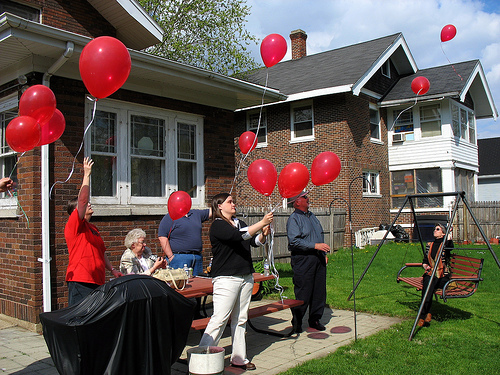
It can be truly humiliating. Maybe it’s never happened to you, but it certainly happens to a lot of us: you’ve been grappling with something for years–your weight, organization, starting a novel, getting the house in order, changing how you act with other people–and a day comes when you’re inspired to do something about it. So you do it! You change your eating habits or start running or create a strict rule for dealing with all incoming e-mails. Then a week or two pass, and you find you’re gone off the rails: your eating habits are worse than ever, or a busy day put you behind on your organization and you never caught up, or the trick you were going to use to remember people’s names has been forgotten itself. What happened?
There’s a simple answer to this and a more detailed answer. The simple answer is that we start things in different circumstances than we continue them in. A New Year’s resolution made at a party with friends on a full stomach (for example) turns into a thankless, lonely grind week after week, and it loses a lot of its sparkle that way.
Don’t worry: the detailed answer is much less depressing than the simple answer. But the simple answer reminds us of something essential: inspiration may drive us to start new things, but it’s our own efforts to rise above obstacles that get us through in the end.
Certainly there is such a thing as a badly-chosen goal, or a good idea for a goal that’s not practical at the moment. But for goals that are worthwhile, there are at least seven ways something that started well could run into trouble. Here’s what those seven kinds of problems are, and how to get past them.
1) The novelty wears off
Annoyingly, somewhere in our evolution we acquired a built-in trait that only allows us to enjoy something for a little while unless it changes. A dish that tastes “amazing” on the first bite and “really good” when we have it again in a few days continues to wane in amazingness as long as we keep eating it regularly. This is known as “hedonic adaptation,” and it means that anything that was delightful and new and exciting eventually becomes old hat unless there’s something renewing that excitement. When we first take on new goals, it helps a lot to understand that we need to not only take the steps to reach our goal, but to keep actively renewing our enthusiasm.
2) Our mood changes
Everyone has better and worse days, days when we feel we can do more and days when we’re mainly just trying to keep things from going wrong. What may seem easy to do on a good day can be the last thing we care about on a bad day. Fortunately, we can stop having bad days if we try, but it also helps to use tactics like rule-making and decision logging to keep ourselves happy with our goals.
3) Things get harder; complications arise
Sometimes we’ll start pursuing a goal when things are going well, but then things get harder: there are new demands on our time or finances or attention, for instance. It may become harder to find time to follow our goals. When the going gets tough, the tough organize and prioritize so they won’t lose track of what’s most important. Goals that aren’t nurtured through busy times tend to get lost in the shuffle.
4) We begin to forget
Goals and new habits need to be nourished and maintained by a process of regular feedback. If we don’t regularly remind ourselves of what we were doing and review our progress, our goals become vague, distant, and easy to forget. Once we’re no longer actively thinking about what we want to achieve, we’re sunk: those habits aren’t going to change themselves. Focusing on our priorities consistently can save them from being forgotten.
5) Just when we start flying, someone shoots us down
There will always be naysayers, whether they’re people who feel threatened by another person’s success or people who genuinely want what they think is best for you but aren’t ready to support your choices. If any of them get to you, figure out what it is they’ve told you that has sunk in and use idea repair to pull it up by the roots. Recruit them to your cause or harden yourself to their criticism: we’re each responsible for our own lives, so while it makes sense to consider good advice, if we’ve considered it and decided to go a different way, we don’t need to consider that same advice again: we’ll need our energy for other things.
6) A new interest takes over
Since things we’re getting used to become less exciting through hedonic adaptation, we human beings are seekers after novelty. This can be fine in a lot of circumstances, but not when it repeatedly derails us on old projects by tantalizing us into taking on new ones. We generally have the resources to undertake only one new thing at a time. After we’ve been in the groove on one goal for a long time, we might consider adding something else, but add something else too early and like it or not, the old goal will very likely go by the wayside. When you’re tempted by a new direction, think carefully about what you’ve invested in the goal you’re already working on and about why it’s important to you in the first place. Of course we have to keep some flexibility, but guard your progress jealously against all but the most important replacement goals.
7) Just announcing it was enough
One interesting psychological study with law students found that students who announced a study goal tended to do worse at achieving that goal than students who kept their goals private. One of the reasons this may be happening is that sometimes, a person can get enough positive feedback for just committing to something that they don’t feel the need to actually follow through–and very often the people who are there to encourage us when we start something aren’t going to be looking over our shoulders to make sure it gets done. Not following through under these circumstances isn’t so much a character flaw as it is a logistical error. Who knew that we would feel so much more satsified and resolved with our current situation just by announcing the intention to change? The enthusiasm for the actual change leaks away, and we may not even realize it’s happening.
If you might be in danger of falling prey to the announcement trap, the safest course is to only announce your goals to people who will be holding you accountable to them. Note that this is hard to do over the Internet; it’s too easy to avoid the subject, or the place where you announced it, or to say vaguely that you’re working on it. Someone who’s going to greet you in person every morning and say “Hey, how’s the novel coming?” is going to be much more help than an online friend who asks the same question, and someone who doesn’t listen to the answer isn’t going to be helpful to you regardless of where they are.
Starting new things and failing at them is so common in human experience that we tend to mark it down as a character flaw, to think that we “just don’t have the willpower.” Fortunately, willpower isn’t so much something you have as something you do. By anticipating the efforts we’ll need to make to move forward with our goals and by proactively handling the kinds of problems we’ve just talked about, we can keep ourselves on track and find ourselves just as committed on day 100 or day 1,000 as we were on day 1.
Photo by greekadman
Like this:
Like Loading...







